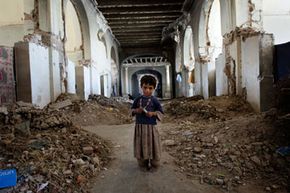Key Takeaways
- Ending war is debated as either an unattainable ideal, given human nature's territorial and aggressive tendencies, or a solvable problem through cultural and spiritual evolution toward peace.
- Some nations, like Costa Rica, have managed to abolish standing armies, reallocating military funds toward education and environmental conservation, showcasing a peaceful coexistence and high levels of national happiness.
- The potential absence of war raises questions about human behavior and societal values, suggesting that peace might lead to more resources for constructive purposes and a shift in how societies address conflict and aggression.
If you could push a button and end war on planet Earth, would you do it? How would a global farewell to arms change the planet, and how would we handle the realized dream of world peace?
For starters, we have to decide exactly what we mean by "war." Philosophers and politicians have spent thousands of years wrestling with the term, but for the purposes of this article, we'll ignore such concepts as "the war on drugs" and "the war on poverty." Instead, we'll define it as a state of armed conflict between states or nations.
Advertisement
So let's say you push that magic button and war as we've defined it ceases to be a possibility. Is it time to stick flowers in our hair and dance in the street? What happens next?
For starters, the militaries of the world wouldn't instantly become obsolete. After all, such forces engage in a number of activities that aren't related directly to armed conflict with other countries, like border protection, disaster relief and response to civil unrest. But if a global end to war means an end to even the potential for armed conflict with other nations, then militaries would swiftly prove overstaffed, overfunded and oversupplied.
The world's combined military budget currently stands at more than $2 trillion [source: GlobalSecurity.org]. In 2007, the United States spent the most of any nations, roughly $741 billion a year, which was 5.2 percent of its gross domestic product [source: GlobalSecurity.org]. So on one hand, the end of war would allow highly militarized nations such as the U.S., China and India to tighten their spending belt or use the money to fund other causes.
But what about jobs? Armies, after all, are made up of people. In 2010, the U.S. military employed more than 1.4 million active service members and 833,000 reservists [source: Reich]. At that time, another 1.6 million Americans worked in companies that support the military. Without wars or the potential for war, many of these people would have to fill other roles in society.
Then there's death to consider. According to a survey from the Institute for Health Metrics and Evaluation, approximately 378,000 war deaths occurred globally each year between 1985 and 1994. Of course, those years also saw the global population rise from an estimated 4.8 billion to 5.6 billion. Without war, individuals would still die from accidents, homicides, suicides at a normal rate, but it's easy to see how the end of war would at least marginally effect population levels around the world.
Plus, imagine all the free time we'd have.
Advertisement




